IV. Translate the sentences into Ukrainian paying attention to the different meanings of the verb “to have”.
I’m going to have a rest now.
In my country people usually have large families.
Let me have a try.
I had a swim to cool down.
I usually have a sandwich for lunch. We have coffee at 11.
I had a cigarette while I was waiting.
How many driving lessons have you had so far?
I have never had a worse morning than today.
I had a shock when I heard the news.
Let’s have a party.
His paintings had a strong influence on me as a student.
I have no doubt that you are right.
I have finished my work.
Do you have any pets?
They’ve got a wonderful house.
We haven’t got a television.
Do you have any money on you?
We didn’t have much time.
I have a shower every morning.
You don’t have to knock – just walk in.
Do they have to make so much noise all the time?
There has to be a reason for his strange behavior.
I haven’t got to get up early tomorrow, I’m pleased to say.
Of course, it had to start raining as soon as I’d hung all the washing out!
V. Translate the sentences into Ukrainian.
Excuse me, have you got a light, please?
Did you have a lot of friends when you lived in London?
Have you got a toothache?
Did you have enough time to answer all the questions in the exam last week?
I need a stamp for this letter. Have you any?
It started to rain when I was walking home. Did it? Did you have an umbrella?
Did you have a beard before you joined the army?
I couldn’t make an omelette. I didn’t have any eggs.
She can’t pay her bills. She hasn’t got any money.
I can’t get into the house. I haven’t my key.
11. Now you have to write some sentences about a man who changed his life-style.
ПРИЙМЕННИК
(The Preposition)
|
Прийменник – це службова частина мови, яка виражає різні відношення між словами в реченні чи словосполученні.
Морфологічні характеристики прийменника.
За будовою прийменники поділяються на:
прості: in, at, out
похідні: below, across, between
складені: in + to = into, up + on = upon
словосполучення: according to, by means of
утворені від дієприкметника: during, including
Семантичні характеристики прийменника. Прийменники виражають різні смислові відношення між словами: часові – Рrepositions of time (прийменники часу), просторові – Рrepositions of place (прийменники місця), напрямок руху об’єкта – Рrepositions of direction (прийменники руху), передають значення відмінків та інші.
Прийменники часу
(Рrepositions of time)
Рrepositions
|
Meaning
|
Example
|
at
|
1) при означенні певної точки часу та при уточненні часу
2) у певних словосполученнях прийменник опускається у питаннях “О котрій годині…?”
|
at 5 o’clock, at 11.45
at night, at midnight, at lunch time
at the week-end
at Christmas, at Easter, at the moment,
at present, at the same time, at the age of
(At) What time do you …?
|
on
|
1) перед датою,
2) днем,
3) також у певних словосполученнях
|
on March 8th
on Monday
on Thursday morning (s)
on Saturday night, on the eve of
|
in
|
1. при означенні відрізків часу:
- місяців
- років, століть
- пір року
2. перед частиною дня
при означенні терміну, у який відбувається дія, а також часовий відрізок у майбутньому
|
In July, in February
In 1993, in the 14th century
In winter
In the morning /evening /afternoon (but! at night, on Friday morning)
in a few minutes, in a year
in six months, in five years
in 7 week’s time
|
Prepositions
|
Meaning
|
Example
|
by
until
till
|
- До певного часу, не пізніше ніж
+ кінець терміну, до певного часу з означенням тривалості дії
|
By the evening, by 2 p.m.
He will be back by Sunday
by that time, by then
He will be away until/till Monday
I stayed in bed until 8 a.m.
Until/till I come back
|
from …to
|
- При означенні початку та кінця дії (з …до)
|
From 10 to 5, from 1998 to 2004
From (the very) beginning
to (the very) end
|
for
during
while
|
- + відрізок часу при означенні терміну тривалості (як довго?), протягом
- + іменник при означенні коли (а не як довго) відбувається дія + підмет + дієслово при означенні коли відбувається дія
|
for seven years, for a month, for half an hour
It rained for three days without stopping (But not! During 3 days)
He felt asleep during the film.
During the day, during my holiday
He felt asleep while he was watching the film.
Compare: They visited a lot of places of interest during their holidays.
They visited a lot of places of interest while they were on holidays.
|
since
|
+ початок відбування дії
|
since the (very) morning
He has been in hospital since Thursday.
It has been raining since I got up.
They have been friends since childhood.
|
before
|
+ іменник, до початку дії
+ герундій
|
Before the exam everybody was very nervous.
before going home
|
after
|
+ іменник, після закінчення дії
+ герундій
|
We were tired after our class.
after getting up
|
Прийменники місця
(Рrepositions of place)
|
in
|
- місцезнаходження у обмеженому просторі
- місцезнаходження у приміщенні
- перед певними словосполученнями
|
In Kyiv, in the river, in the country, in the world
The meeting will be in the cinema
She is in the office/in the school.
NB! In the street (=BE, on the street = AE)
in the picture/photo, in the field, in the sky
in the middle of
in a car (but: on a bus/ train/plane)
|
Prepositions
|
Meaning
|
Example
|
at
|
- місцезнаходження об’єкта у безпосередній близькості до
|
at the window/ at the corner
at the bus-stop.
|
- іншого об’єкта; укр.
відповідники = біля, на
- перед назвами невеликих міст, селищ; укр. Відповідники = в, на
- при вказівці на місце, де відбувається якийсь процес або дія; укр. Відповідники = в, на
|
at the station
at Smotrich
They are at the lecture/ she works at the shop. He is at hospital.
|
under
below
|
- Розташування об’єкта під іншим об’єктом;
- укр. відповідник = під
- під, нижче ніж, антонім above
|
under the table, under the water
below the surface,
below zero
|
over
above
|
- над
- понад, більше ніж
- над, вище ніж, антонім below
- понад, більше ніж
|
A lamp hangs over the table.
There are over 30 students in the group.
Raise your arms above your head.
The temperature is above zero.
500 feet above sea level
|
next to = beside
by
|
- поруч, близько
- поруч із, поряд
- біля
|
The church is next to the station.
She came and sat beside me.
by the table, by the window
|
opposite
|
- навпроти
|
The girl sitting opposite me was familiar.
opposite the door/window
|
between
among
in front of
behind
inside
|
- між, у просторі між 2 об’єктами
- між, у часі між 2 об’єктами
- поміж, серед, у просторі між більше ніж 2 об’єктами
- перед об’єктом, попереду
- позаду
- усередині
|
between the garden and the field
The house was hidden among the trees. She found a pen among the books.
There is a lawn in front of the house.
behind the house, behind the rest of the class,
inside the envelope
|
|
|
|
Прийменники руху
(Рrepositions of direction)
|
in, into
|
- заходити y…
|
Ann opened the door of the car and got in (- into the car)
|
out
|
- рухатись з...
|
The car stoped and a woman got out. (- out of the car)
|
up
|
- рухатись вверх
|
He stood up and left the room. Go up the stairs.
|
down
|
- рухатись вниз
|
Would you like to sit down. The picture fell down.
|
back
|
- повертатись назад
|
Ann is away. She’ll be back on Monday. Go away and don’t come back.
|
over
turn over
|
- рухатись через...
- перегортати
|
The wall wasn't high, so we climbed over.
Turn over and look at
the next page.
|
to
|
- рухатись по направленню
|
He is going to school now.
|
from
|
- рухатись від...
|
We walked from the hotel to the station.
|
through
|
- через
|
The old road goes through the village.
|
round
(or around)
|
- навколо
|
Somebody shouted my name, so I looked round (or around)
|
along
|
- рухатись вздовж
|
I was walking along the road with my dog.
|
across
|
- рухатись через
|
The dog swam across the river.
|
past
|
- проходити повз
|
They walked past me without speaking.
|
Phrasal Verbs
Go in, fall off, run away etc.
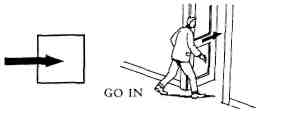 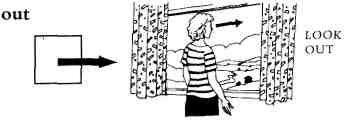
out
in
LOOK
OUT
GO IN
Ann opened the door of the car and got
in. (= into the car)
I waited outside the house. I didn’t go in.
|
The car stopped and a woman got out.
(= out of the car)
I went to the window and looked out.
|
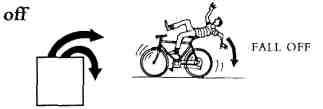 
on
off
FALL OFF
GET ON
• The bus arrived and I got on.
|
Be careful! Don’t fall off
|

STAND UP

FALL
DOWN
• He stood up and left the room.
• I usually get up early. (= get out of bed)
• We looked up at the stars.
|
Would you like to sit down?
The picture fell down.
Lie down on the floor.
|
 
Away or off
back
GO
COME BACK
The thief ran away, (or... ran off)
• Ann got into the car and drove away. (or... drove off)
be/go away (= in/to another place);
• Ann has gone away for a few days.
|
We went out for dinner and then went back to our hotel.
Go away and don’t come back!
be back:
Ann is away. She’ll be back on Monday.
|
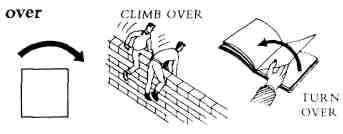 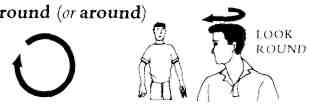
LOOK
ROUND
TURN OVER
• The wall wasn’t very high, so we climbed over.
• Turn over and look at the next page.
|
Somebody shouted my name, so I looked round (or around).
We went for a long walk. After six miles we turned round (or around) and went back.
|
ask (somebody) for...
belong to...
happen to …
listen to …
speak/talk to somebody about something
thank somebody for...
think about … or think of...
wait for …
write to somebody
but (tell) phone some-
body (no preposition)
|
• A man stopped me and asked me for money.
• Does this book belong to you? (= Is this your book?)
• I can’t find my pen. What’s happened to it?
• Listen to this music. It’s beautiful.
• Did you talk to Paul about the problem?
• (on the phone) Can I speak to Chris, please?
• Thank you very much for your help.
• He never thinks about (or of) other people.
• Mark is thinking of (or about) buying a new car.
• Don’t go yet. Wait for me.
• I never get letters. Nobody writes to me.
• I must phone my parents, (not ‘phone to my parents’)
|
look at / look for / look after
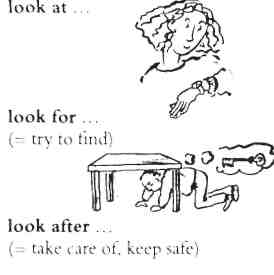
look at …
look for …
(= try to find)
look after …
(= take care of, keep safe)
|
• She’s looking at her watch.
• Look at these flowers! They’re beau-
tiful.
• Why are you looking at me like that?
• He’s lost his key. He’s looking for it.
• I’m looking for Sarah. Have you seen her?
• When Barbara is at work, a friend of hers looks after her children.
• Don’t lose this book. Look after it. (= Keep it safe.)
|
depend
We say depend on...
A: Do you like eating in restaurants?
B: Sometimes. It depends on the restaurant, (not ‘it depends of’)
You can say it depends what/where/how (etc.) with or without on:
A: Do you want to come out with us?
B: It depends where you’re going, or It depends on where...
For word order (It depends where you’re going.).
|
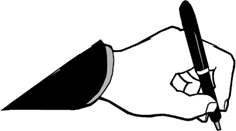
Exercises
I. Put in: at, in, on, or, no preposition.
_____________ Christmas.
______________ Monday.
______________ 2005.
______________ the morning.
______________ Thursday evening.
_______________ June.
_______________ next Wednesday.
_______________ Sunday afternoon.
______________ this morning.
I don’t know _________ what time.
II. Complete the sentence “I was … yesterday” by using the given word and the correct preposition at or in.
Example: work
Response: I was at work yesterday.
1. class 6. the bookstore
2. the reading-hall 7. work
3. Lviv 8. university
4. home 9. a hostel
5. cinema 10. Room 105
III. Put in the prepositions.
after, before, above, opposite, over, along
|
There’s a garage on the other side of the street just _________ my house.
B comes ______ A and _______ C in the alphabet.
He walked slowly _____ the street.
The cat went _______ the bridge.
I can’s see the plane because it is high _______ the clouds.
IV. Ask and answer questions about location.
Student A: Begin the question with “Where were you …?”.
Student B: Use at or in the answer.
Example: yesterday afternoon.
Student A: Where were you yesterday afternoon?.
Student B: I was in class.
at five o’clock last night.
at two o’clock yesterday afternoon.
after dinner yesterday.
this morning at nine o’clock.
two weeks ago.
four years ago.
on your last vocation.
when you were ten years old.
V. Unscramble the sentences.
1. you / at / in / bath / moment / I /the / was / the / call.
2. I / how / cinema / get / the / to / do.
3. the / right / take / first / on / the turning.
4. left / your / on / It’s.
5. you / the / park ?/ tell / way / to / can / me / central.
VI. Write in the missing prepositions.
Mary sits _______ the chair when she has her meals _____ the dining room. ______ her sits Bob. He is ____ her right and Nick is ______ her left. The dining room is _____ the first floor. The ground floor has a big kitchen. It is _____ the dining room and so the dining room is ____ the kitchen. There are a lot of glasses _______ the table _____ the kitchen and there are some _______ the cupboard.
VII. Check the correct translation.
1. Ann is in front of John.
а) Енн стоїть поряд з Джоном.
b) Енн стоїть перед Джоном.
с) Енн стоїть за Джоном.
2. Promise to keep this news under your hat.
а) Обіцяй, що розповіси мені цю новину.
b) Обіцяй, що будеш берегти цю новину.
с) Обіцяй, що будеш тримати цю новину в таємниці.
3. I’m looking for the police station.
а) Я спостерігаю за поліцейською дільницею.
b) Я шукаю поліцейську дільницю.
с) Я дивлюсь на поліцейську дільницю.
4. I go there by tube.
а) Я поїду на автобусі.
b) Я візьму таксі.
с) Я їду туди на метро.
5. Walk across the street.
а) Перейди через вулицю
b) Йди по вулиці.
с) Поверни на цю вулицю.
6. Take the first turning on the left.
а) На першому повороті зверни ліворуч.
b) На першому повороті зверни праворуч.
с) На перехресті зверни ліворуч.
7. He did these things under your nose all this time.
а) Він займається цим без всякого сорому весь цей час.
b) Він займається цим в тебе під носом весь цей час.
с) Він робив це з твоїм носом весь цей час.
8. Turn right into Liberty Street.
а) Перейди Ліберті-стріт.
b) Дійди до Ліберті-стріт.
с) Поверни праворуч на Ліберті-стріт.
VIII. Translate the sentences.
1. Він зараз в університеті й повернеться о п’ятій годині.
2. Візьми документи у столі, що стоїть біля вікна між шафою та полицями.
3. Я не знайшла його серед студентів, які зібралися на площі.
4. На Новий рік я буду у друзів і залишуся там до понеділка.
5. Зазвичай я їду до університету автобусом, іноді йду пішки.
6. Він тут з минулого вівторка і закінчить цю роботу через тиждень.
7. Ми шукали кошеня усередині, позаду і перед будинком, а воно сиділо на дереві.
8. Я народилась восени, десятого жовтня.
9. Ліворуч буде пошта, праворуч – банк, а навпроти банку – крамниця, яку ви шукаєте.
10. У тебе є з собою цікава книжка почитати у потягу?
IX. Complete three sentences about yourself.
1. At 8 o’clock this morning I was _______
2. Yesterday I went ________
3. One day I’d like to go ________
4. Next year I hope to go ________
5. At 9 o’clock yesterday evening I was _______
X. Complete the sentences with prepositions of time.
1. We have class at ten o’clock
2. I have class________ the morning
3. I work _______ the afternoon
4. I study _______ the evening
5. I sleep _________ night
6. I was born _________ June
7. I was born __________1974
8. I was born ___________ October 12
9. I was born __________ October 12, 1974
10. The post office isn’t open __________ Sunday
11. The post office is open __________ 8.00 a.m. – 5.00 p.m. Monday
12. The post office closes __________ 5.00 p.m
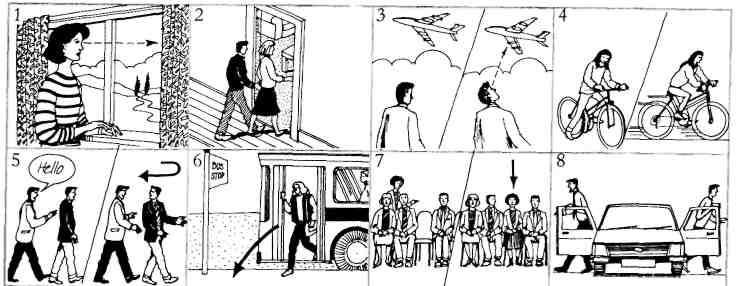 XI. Look at the pictures and complete the sentences. Use the verbs in the list + in/out/up etc. XI. Look at the pictures and complete the sentences. Use the verbs in the list + in/out/up etc.
got got look looked rode sat turned went
1. I went to the window and
2. The door was open, so we
3. He heard a plane, so he
4. She got on her bike and
|
5. I said hello and he
6. The bus stopped and she
7. There was a free seat, so she
8 A car stopped and two men
|
XII. Complete the sentences. Use out/away/back etc.
1. ‘What happened to the picture on the wall?’ ‘It fell ………..’
2. Please don’t go……! Stay here with me.
3. She heard a noise behind her, so she looked……
4. I’m going now to do some shopping. I’ll be……at 5 o’clock.
5. I’m feeling very tired. I’m going to lie……on the sofa.
6. When you have read this page, turn……and read the other side.
7. Jim is from Canada. He lives in London now but he wants to go to Canada.
8. We haven’t got a key to the house, so we can’t get……
9. I was very tired this morning. I couldn’t get……
10. Ann is going on holiday next month. She’s going……on the 5th and comingon the 24th.
XIII. Complete the sentences. Use a verb from the box + on/off/up etc. If necessary, put the verb into the correct form. All these phrasal verbs (wake up etc.) are in Appendix 6.
break fall give slow take
carry get hold speak wake
|
+ on/ofi/up/down/over
|
1. I went to sleep at 10 o’clock and ……… at eight o’clock the next morning.
2. ‘It’s time to go.’ ‘……………….a minute. I’m not ready yet.’
3. The train…………………and finally stopped.
4. I like flying but I’m always nervous when the plane……………… .
5. How was your exam? How did you……………………………….?
6. It’s difficult to hear you. Can you…………………………..
a little?
7. This car isn’t very good. It has …………………...….. many times.
8. When babies try to walk, they sometimes ……………………….. .
9. I told him to stop but be ………………. Perhaps he didn’t hear me.
10. I tried to find a job but I ………………..It was impossible.
 X X
1
2
3
4
5
6
PAUL
IV. Look at the pictures and complete the sentences with a preposition (to/for etc.).
JANE
SUE
She’s looking her watch.
He’s listening the radio.
They’re waiting a taxi.
|
Paul is talking Jane.
They’re looking a picture.
Sue is looking Tom.
|
XV. Complete the sentences with a preposition (to/for/about etc.) if necessary.
Thank you very much your help.
This is not my umbrella. It belongs a friend of mine.
(on the phone) Can I speak Mr. Davis, please?
(on the phone) Thank you phoning. Goodbye.
What happened Mary last night? Why didn’t she come to the party?
We’re thinking going to Australia next year.
We asked the waiter coffee but he brought us tea.
‘Do you like reading books?’ ‘It depends the book.’
John was talking but nobody was listening what he was saying.
We waited Karen until 2 o’clock but she didn’t come.
‘Are you writing a letter?’ ‘Yes, I’m writing Diane.’
Don’t forget to phone your mother this evening.
He’s alone all day. He never talks anybody.
‘How much does it cost to stay at this hotel?’ ‘It depends the type of room
Catherine is thinking changing her job.
XVI. Complete these sentences. Use at/for/after.
1. I looked the newspaper but I didn’t read it carefully.
2. When you are ill, you need somebody to look you.
3. Excuse me, I’m looking Hill Street. Can you tell me where it is?
4. Goodbye! Have a nice holiday and look yourself.
5. I’m going to take a photograph of you. Please look the camera and smile.
6. Barry is looking a job. He wants to work in a hotel.
XVII. Answer these questions with It depends....
1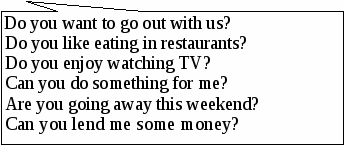 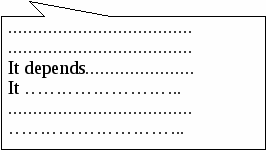 | |
2
3
4
5
6
Кількісні числівники
Cardinal numerals
|
Порядкові числівники
Ordinal numerals
|
Це числівники, що означають абстрактну математичну кількість (six, seventeen) чи кількість предметів при лічбі (fivebooks, sevendesks).
|
Числівники, що означають порядок предметів при лічбі (thefifthbook, theseventhdesk).
|
КІЛЬКІСНІ ЧИСЛІВНИКИ
Cardinal numerals
Прості
|
Похідні
|
Складені
|
Від 1 до 12 (one, two, three, four, five, six, seven, eight, nine, ten, eleven, twelve), а також 100 (а/onehundred); 1,000 (а/onethousand); 1,000,000 (а/onemillion);
1,000,000,000 (а/onemilliard);
|
- Від 13 до 19 та назви десятків.
- Числівники від 13 до 19 утворюються додаванням суфікса – teen до відповідних числівників першого десятка six – sixteen, nine – nineteen, (але деякі числівники перед суфіксом зазнають змін у написанні і вимові, слід дивитись в таблицю).
- Назви десятків утворюються додаванням суфікса -ty до відповідного числівника першого десятка six – sixty, nine – ninety (деякі з них зазнають змін у вимові, див. таблицю).
|
- Це числівники, що позначають числа, які складаються з десятків і одиниць.
- Між десятками і наступними за ни-
ми одиницями ставиться дефіс (21 – twenty-one; 35 – thirty-five).
- У складених числівниках перед десятками (а якщо немає десятків, то перед одиницями) у будь-якому розряді вживається слово and, яке вимовляється [qn] або [in] (345 – three hundred and forty five, 5003 – five thousand and three).
|
ПОРЯДКОВІ ЧИСЛІВНИКИ
Оrdinal numerals
Прості та похідні
|
Складені
|
Прості та похідні числівники, крім перших трьох (1 – one – first; 2 – two-second; 3 – three-third) утворюються з відповідних кількісних числівників додаванням суфікса – th. Деякі з них зазнають змін у написанні та вимові. (див. таблицю).
|
У складених числівників форму порядкового числівника має лише останнє слово:
24th – twenty-fourth
789th – seven hundred and eighty-ninth
|
Таблиця числівників
Першого десятка
|
Другого десятка
|
Кількісні
Cardinal
|
Порядкові
Ordinal
|
Кількісні
Cardinal
|
Порядкові
Ordinal
|
1 one
2 two
3 three
4 four
5 five
6 six
7 seven
8 eight
9 nine
10 ten
|
(the) first
(the) second
(the) third
(the) fourth
(the) fifth
(the) sixth
(the) seventh
(the) eighth
(the) ninth
(the) tenth
|
11 eleven
12 twelve
13 thirteen
14 fourteen
15 fifteen
16 sixteen
17 seventeen
18 eighteen
19 nineteen
|
(the) eleventh
(the) twelfth
(the) thirteenth
(the) fourteenth
(the) fifteenth
(the) sixteen
(the) seventeenth
(the) eighteenth
(the) nineteenth
|
Десятки
|
Багатозначні та складені числівники
|
Кількісні
Cardinal
|
Порядкові
Ordinal
|
Кількісні
Cardinal
|
Порядкові
Ordinal
|
20 twenty
30 thirty
40 forty
50 fifty
60 sixty
70 seventy
80 eighty
90 ninety
|
(the) twentieth
(the) thirtieth
(the) fortieth
(the) fiftieth
(the) sixtieth
(the) seventieth
(the) eightieth
(the) ninetieth
|
100 а/one hundred
1,000 а/one thousand
1,000,000 а/one million
1,000,000,000 а/one milliard (BE)
а/one billion (AE)
32 thirty-two
56 fifty – six
695 six hundred and
ninety – five
|
(the) hundredth
(the) thousandth
(the) millionth
(the) milliardth
(the) billionth
(the) thirty – se-
cond
(the) fifty – sixth
(the) six hundred and ninety – fifth
| |
 Скачать 2.7 Mb.
Скачать 2.7 Mb.









 XI. Look at the pictures and complete the sentences. Use the verbs in the list + in/out/up etc.
XI. Look at the pictures and complete the sentences. Use the verbs in the list + in/out/up etc. X
X 
 |
|
